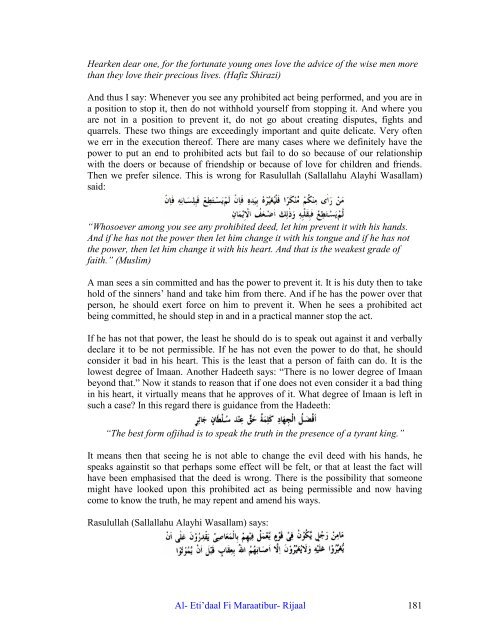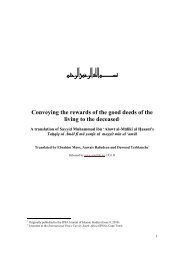al_etidaal_gn
al_etidaal_gn
al_etidaal_gn
You also want an ePaper? Increase the reach of your titles
YUMPU automatically turns print PDFs into web optimized ePapers that Google loves.
Hearken dear one, for the fortunate young ones love the advice of the wise men more<br />
than they love their precious lives. (Hafiz Shirazi)<br />
And thus I say: Whenever you see any prohibited act being performed, and you are in<br />
a position to stop it, then do not withhold yourself from stopping it. And where you<br />
are not in a position to prevent it, do not go about creating disputes, fights and<br />
quarrels. These two things are exceedingly important and quite delicate. Very often<br />
we err in the execution thereof. There are many cases where we definitely have the<br />
power to put an end to prohibited acts but fail to do so because of our relationship<br />
with the doers or because of friendship or because of love for children and friends.<br />
Then we prefer silence. This is wrong for Rasulullah (S<strong>al</strong>l<strong>al</strong>lahu Alayhi Was<strong>al</strong>lam)<br />
said:<br />
“Whosoever among you see any prohibited deed, let him prevent it with his hands.<br />
And if he has not the power then let him change it with his tongue and if he has not<br />
the power, then let him change it with his heart. And that is the weakest grade of<br />
faith.” (Muslim)<br />
A man sees a sin committed and has the power to prevent it. It is his duty then to take<br />
hold of the sinners’ hand and take him from there. And if he has the power over that<br />
person, he should exert force on him to prevent it. When he sees a prohibited act<br />
being committed, he should step in and in a practic<strong>al</strong> manner stop the act.<br />
If he has not that power, the least he should do is to speak out against it and verb<strong>al</strong>ly<br />
declare it to be not permissible. If he has not even the power to do that, he should<br />
consider it bad in his heart. This is the least that a person of faith can do. It is the<br />
lowest degree of Imaan. Another Hadeeth says: “There is no lower degree of Imaan<br />
beyond that.” Now it stands to reason that if one does not even consider it a bad thing<br />
in his heart, it virtu<strong>al</strong>ly means that he approves of it. What degree of Imaan is left in<br />
such a case? In this regard there is guidance from the Hadeeth:<br />
“The best form ofjihad is to speak the truth in the presence of a tyrant king.”<br />
It means then that seeing he is not able to change the evil deed with his hands, he<br />
speaks againstit so that perhaps some effect will be felt, or that at least the fact will<br />
have been emphasised that the deed is wrong. There is the possibility that someone<br />
might have looked upon this prohibited act as being permissible and now having<br />
come to know the truth, he may repent and amend his ways.<br />
Rasulullah (S<strong>al</strong>l<strong>al</strong>lahu Alayhi Was<strong>al</strong>lam) says:<br />
Al- Eti’da<strong>al</strong> Fi Maraatibur- Rija<strong>al</strong> 181




